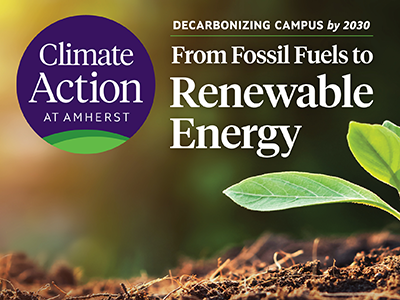Project Signifies Major Step Toward Goal of Decarbonizing Campus by 2030
(AMHERST, Mass., April 6, 2023) — As part of one of the most necessary and ambitious infrastructure projects in the institution’s history, Amherst College has begun transitioning the campus’ heating and cooling systems from steam to a modern, low-temperature hot-water geothermal system. The project is a critical element of Amherst’s Climate Action Plan (CAP) and represents a major step in the College’s goal of decarbonizing the campus’s energy system by 2030.
“I am thrilled to see the CAP work beginning,” said President Michael A. Elliott. “Transitioning the College’s heating and cooling system is both transformative and a crucial part of decarbonizing our campus energy system that will benefit the College for decades to come.”
The Climate Action Plan Construction Project will take place over the next decade and will require most campus buildings to be retrofitted for this technology change. Pipes for the new system will be installed to connect buildings on the east side of campus, which requires trenches to be dug. This work has already begun in earnest on the west side of the College’s Science Center. (The College’s website offers information about the construction timeline and location, as well as answers to some frequently asked questions.)
“Amherst recognizes the significance and importance of addressing climate change, and is taking one of the most proactive and ambitious approaches within higher education to weaning ourselves from our fossil fuel dependence,” said Weston Dripps, director of sustainability. “In addition to signifying a major change for the College, it represents our own institution’s effort to help address climate change, one of the greatest challenges humanity has ever faced. We know how important it is to not just talk the talk, but actually walk the walk.”
At present, Amherst’s main source of emissions is fossil fuel combustion that produces electricity and heats buildings. To address the College’s electricity needs, in 2018 Amherst and four other New England Colleges invested in—and now purchase—electricity from the Farmington solar project. The next step of Amherst’s CAP commitment is transitioning to a low-temperature hot-water geothermal system for heating and cooling campus buildings. This will enable the College to minimize its reliance on fossil fuels, which are currently required for emergency backup (power failure) and peak loads on the coldest days. Meaningful carbon offsets (compensation for emissions) will also be used to meet the goal of decarbonizing campus by 2030.
Once the work of each phase is completed, the landscape will return to normal and those familiar with campus should not be able to tell that construction has taken place.
